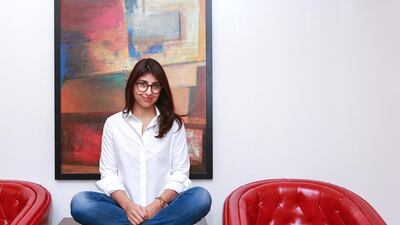Shefali Verma describes herself as a medical detective. After training as a doctor in the UK, she completed a master’s in sports medicine and worked as a medic for the Commonwealth Games in Manchester and the London Marathon. She later studied nutritional therapy at Greenwich University and now works as an “integrated medical specialist” – in other words, a conventional doctor with knowledge of nutritional medicine. Dr Verma, 38, was born to Indian parents but grew up in the UAE. Here, she reveals how she juggles being a wife and mother of three-year-old twins with being a partner at the Institute of Biophysical Medicine in Dubai Healthcare City.
5am
I start my day with a run. I took two weeks off after completing the marathon in Dubai at the end of January, but I am running again because I’m training for a half-Ironman in Germany in June. I’m now working on my speed.
6.30am
I get home from my run. I am a mum of twin girls who are only three, so I try to balance home life with work, which is important. Because of my girls I do different times at the clinic, some morning clinics and some afternoon. If the girls are at nursery I’ll hold morning clinics. Those days I drop them to nursery for 8am and then go to work. Going from just being a doctor to also running your own clinic is like having two jobs. There is definitely more stress because you are trying to be that doctor, where you remain ethical, yet also having your mind on the business and how it can grow. At the end of the day, the business is also a reality – money, income and so forth.
8.30am
I see my first patient. In the first consultation, it’s about getting to know the person from birth until today, and possibly then in terms of pre-birth, so the mum’s health during conception and pregnancy. I’m trying to be a sort of medical detective I guess. If a kid has allergies at birth or colic, you want to know about the mum. Did she have a dairy allergy? Did she have any issues in terms of gut function or dietary problems? Those can affect a child, especially if they are not breast-fed or were born via a c-section. A caesarean section changes the child’s gut flora. Passing through the birth canal and getting all the good bacteria versus the most sterile of all environments in a c-section changes the way a child is designed to come out. So it can affect the child, especially in the early years. The more knowledge you have about their history, the easier it is to make decisions on therapies. I see a lot of digestive IBS-type scenarios as well as auto-immune, thyroid and hormonal irregularities where they are often cleared by conventional medicine but they still don’t feel well. So they are not sick but they’re not well. It is trying to look into that so we are not just symptom controlling but trying to prevent and kind of backtrack as to where the problem may lead. I tend to see six to seven patients on an average morning.
12.30pm
I pick up the girls from nursery. I returned to work when they were only three months old because I started this clinic at the same time I became pregnant. But with your own clinic comes flexibility; I never have to stay a whole day. At home, we eat lunch together, play and sometimes read a book or bake together. Sometimes they practise on their bikes if the weather is nice. And twice a week they do Brazilian jiu-jitsu, which is a martial art.
6pm
I head to a circuit class at my husband’s facility. He is a sports therapist and a partner in Transform Specialist Medical Centre. I train there twice a week. I dislocated shoulder, so I do my rehab and strength training there. My class runs from 7pm to 8.30pm so I’m home for 9pm; on those days my mum helps put the girls to sleep. Then we wind down.
Midnight
I’d like to go to bed around 11pm but end up pushing it to 12am because I need more time to wind down from the busy day. On days I have a very early run I try to go to bed much earlier. I pack a lot in.
business@thenational.ae
Follow The National's Business section on Twitter


